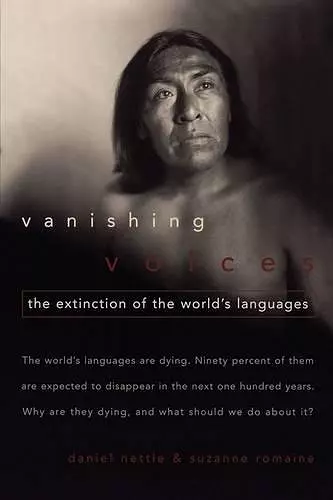Vanishing Voices
The Extinction of the World's Languages
Daniel Nettle author Suzanne Romaine author
Format:Paperback
Publisher:Oxford University Press Inc
Published:25th Jul '02
Currently unavailable, currently targeted to be due back around 19th September 2025, but could change
This paperback is available in another edition too:
- Hardback£28.99(9780195136241)

Recipient of the 2001 Book of the Year Award from the British Association of Applied Linguistics
Half of all known languages have disappeared in the last 500 years and 90 per cent of all languages are in danger of becoming extinct in the next 100. The authors argue that the loss of linguistic and biological diversity is part of a much larger problem - the collapse of our worldwide ecosystem.A dramatic account of the rate of language extinction, and how it endangers the future of biodiversity Few people know that nearly 100 native languages once spoken in what is now California are near extinction, or that most of Australia's 250 aboriginal languages have vanished. In fact, at least half of the world's languages may die out in the next century. What has happened to these voices? Should we be alarmed about the disappearance of linguistic diversity? The authors of Vanishing Voices assert that this trend is far more than simply disturbing. Making explicit the link between language survival and environmental issues, they argue that the extinction of languages is part of the larger picture of near-total collapse of the worldwide ecosystem. Indeed, the authors contend that the struggle to preserve precious environmental resources-such as the rainforest-cannot be separated from the struggle to maintain diverse cultures, and that the causes of language death, like that of ecological destruction, lie at the intersection of ecology and politics. And while Nettle and Romaine defend the world's endangered languages, they also pay homage to the last speakers of dying tongues, such as Red Thundercloud, a Native American in South Carolina, Ned Mandrell, with whom the Manx language passed away in 1974, and Arthur Bennett, an Australian, the last person to know more than a few words of Mbabaram. In our languages lies the accumulated knowledge of humanity. Indeed, each language is a unique window on experience. Vanishing Voices is a call to preserve this resource, before it is too late.
Review from previous edition "[A] superb study of endangered languages.... The tapestry of supporting detail is every bit as compelling as the central thesis-- from an examination of how indigenous languages function as museums of local culture to a history of the way in which dominant languages like English,Mandarin, and Spanish have vanquished more vulnerable tongues." * The New Yorker *
"Language extinction is a great tragedy for human culture and for scholarship on all things human. This fascinating book is the latest word on this important issue, containing a wealth of knowledge and wisdom. If we have the good sense to rescue the priceless legacy of linguistic diversity before it vanishes forever, Vanishing Voices will surely deserve a good part of the credit." * Steven Pinker, author of The Language Instinct and Words and Rules *
". . . this clear, cogent and immensely knowledgeable book. . . . Vanishing Voices is a book that needs to be chain-read, therefore: read it, then tell someone else to." * Prof David Crystal, THES *
"Vanishing Voices is an urgent call to arms about the impending loss of one of our great resources. Nettle and Romaine paint a breathtaking landscape that shows why so many of the world's languages are disappearing and more importantly, why it matters. They put the problem of linguistic diversity into the wider context of global biodiversity, and propose the revolutionary idea that saving endangered languages is not about dictionaries and educational programs, but about preserving the cultures and habitats of the people who speak them. Along the way it's also a fascinating introduction to how language works: how languages are born, how they die, and how we can prevent their death." * Deborah Tannen, Georgetown University *
a "splendid and disturbing book." * The Irish Times (Dublin) *
ISBN: 9780195152463
Dimensions: 234mm x 155mm x 18mm
Weight: 372g
256 pages